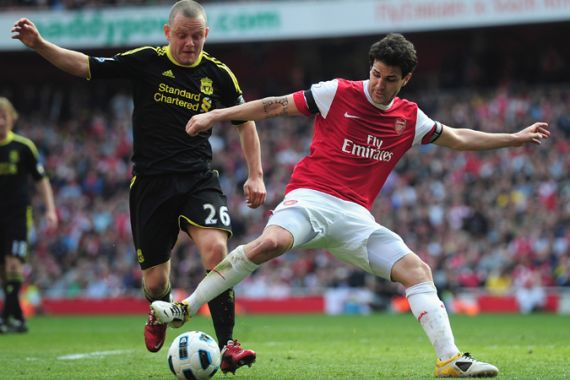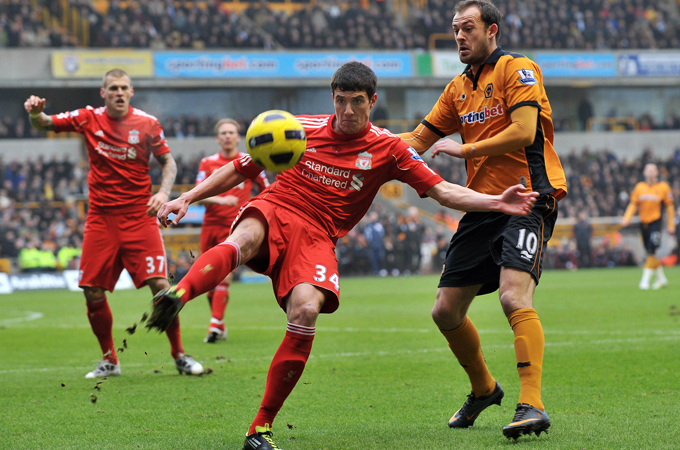Drinking from football’s fountain of youth
Arsenal should take note from Liverpool’s inspirational young guns.

 |
| Harking back to the old days for Arsenal – Tony Adams, left, would[GALLO/GETTY] |
If only Arsenal’s fragile youngsters had the steeliness of the whiz kids on Liverpool’s books, the Gunners might have a realistic chance of stopping Manchester United swooping in on a record-breaking 19th top-flight English title.
Like a ‘tut-tutting’ schoolteacher, manager Arsene Wenger winces and whines as his charges repeatedly lose concentration in the classroom.
Keep reading
list of 4 items‘Disgrace’: Ten Hag slams criticism over Man United’s FA Cup semifinal win
Inter win heated Milan derby to seal 20th Siere A title
Bellingham’s late El Clasico winner leaves Madrid with one hand on La Liga
Just one of their previous six games produced a victory and their last two matches saw four precious points dropped after leads were blown.
When Arsenal let slip a two-goal cushion at Tottenham mid-week, Wenger blamed it on exhaustion because his squad were playing the second of two games in four days. But the reality is that they came up short once again in the toughness department.
As ex-captain Patrick Vieira so succinctly put it last week, most of the pampered current squad wouldn’t dare plant their feet where fearless former stars used to put their heads.
That kind of courage is the difference between winning silverware – as the likes of Vieira, Tony Adams and Ray Parlour did – and being perennial bridesmaids.
The unfashionable teenagers on Liverpool’s books probably have only a fraction of the technical ability of the likes of Jack Wilshire, Samir Nasri and Cesc Fabregas.
Yet, on the evidence on some of their fighting displays this season, including their trip to the Emirates Stadium last Sunday, they might be the kind of people you’d prefer to have around in a crisis.
Teenage fullbacks John Flanagan and Jack Robinson, 19-year-old Jonjo Shelvey and fellow midfielder Jay Spearing, 22, have all caught the eye this season. Utility back Martin Kelly, 20, is another youngster who made an impression, even playing in the Europa League before being sidelined by a hamstring injury.
Having worked with the Reds’ academy, manager Kenny Dalglish has plumped for the youngsters ahead of some underperforming senior players. He marvelled this week that once again the wheels are turning smoothly within Liverpool’s junior production line.
“Too many clubs just want to buy and replace players and are not willing to give youth a chance so I think Kenny is doing a great job in going back to Liverpool’s youth system,” said Tim Bredbury, the former Hong Kong international and Liverpool squad player.
“Having been involved with the academy players for a number of years he knows what he has in terms of players. The ones he put into the Arsenal game are comfortable around him and know him, so they have confidence with him.”
More than three decades ago, Bredbury was one of the youngsters on Liverpool’s books, hoping to crack the big time. Born in Hong Kong and educated at King George V School, he headed to Merseyside for a trial as a 16-year-old striker after his father wrote to the club.
After two years as an apprentice, he signed as a full-time professional for the 1981-82 season at the height of Liverpool’s golden era. But with forwards in front of him like David Fairclough, Ian Rush and Dalglish himself, Bredbury never got close to a first-team appearance, although he did make the reserve team squad.
“In my time, there was no academy set up and no real development plan in place,” he said.
“Players were signed on pure talent and then put into their system, which was all about passing and movement with no technical coaching like today.”
With Dalglish the common thread between that era and today, Bredbury can see similarities when it comes to blooding emerging talent.
“The secret to the club back then was that they could replace any player with another and not affect the team performance,” he said.
“We are going back to the old ways as the new players know the system and it was just a case of slotting
in and taking your chance, which they did against Arsenal.”
Spice boys
 |
| Liverpool’s rising star Martin Kelly [EPA] |
In the 1990s, Liverpool’s glamorous squad of internationals was known as the Spice Boys because style often won over substance. The low point was at the 1996 FA Cup final against Manchester United when they paraded around Wembley Stadium in cream Emporio Armani suits before suffering a 1-0 defeat to Manchester United, which was one of many near misses by an underperforming team.
There can be mixing up ‘Old Spice’ with ‘New Spice’ at Anfield. Many of the class of 2011 have no-frills airstyles and are unlikely to follow 1990s favourites like David James, Jamie Redknapp and Steve McManaman into modelling or media careers.
And when Jay Spearing was interviewed after accepting his man-of-the-match award at the Emirates Stadium, some Asian viewers may have benefited from subtitles to decipher his thick Scouse accent.
The verdict is out on whether the likes of Spearing, Shelvey, Flanagan and Robinson will help usher in a bright new chapter or simply turn into professional journeymen. Certainly having a base of English or locally-reared players does seem to help when it comes to team spirit.
“The club under Kenny will get back to a strong British foundation with players who are used to playing a full EPL season and youngsters given a chance but with some foreign flair as and when required,” Bredbury said.
“I would like to see some quick wide players like Matthew Etherington and Ashley Young signed along with a creative midfield player and dominant centre halves who can win balls and score from set pieces.”
Certainly the depth of Liverpool’s squad isn’t what it used to be. And with Dalglish needing to clear out a few recent additions signed by previous managers who simply haven’t performed, there are likely to be more significant signings to join Andy Carroll and Luis Suarez on Merseyside.
In the meantime, Liverpool will drink from the fountain of youth and continue to be surprised about how refreshing it tastes.
Jason Dasey (www.jasondasey.com) is an Asia-based international broadcaster of the English Premier League, a corporate emcee and media trainer. This column first appeared in the South China Morning Post on April 22.
Al Jazeera is not responsible for the content of external websites.